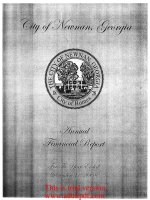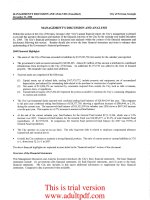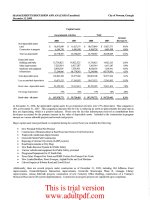Department of Administration Statewide Audit — Selected Audit Areas For the Year Ended June 30, 1998 January 1999 potx
Bạn đang xem bản rút gọn của tài liệu. Xem và tải ngay bản đầy đủ của tài liệu tại đây (362.24 KB, 9 trang )
Department of Administration
Statewide Audit — Selected Audit Areas
For the Year Ended June 30, 1998
January 1999
Financial Audit Division
Office of the Legislative Auditor
State of Minnesota
99-1
Centennial Office Building, Saint Paul, MN 55155 651/296-4708
SUMMARY
State of Minnesota
Office of the Legislative Auditor
1st Floor Centennial Building
658 Cedar Street • St. Paul, MN 55155
(651)296-1727 • FAX (651)296-4712
TDD Relay: 1-800-627-3529
email:
URL:
Department of Administration
Statewide Audit – Selected Audit Areas
For the Year Ended June 30, 1998
Public Release Date: January 8, 1999 No. 99-1
Background Information
The Department of Administration provides a variety of business management and administrative
services to state and local government agencies. Its major programmatic areas include the
InterTechnologies Group, the Operations Management Bureau, the Facilities Management
Bureau, and the Technology Management Bureau. The department’s funding sources include
user fees, legislative appropriations, gifts, and federal grants. Ms. Elaine Hansen was the
commissioner of the department during the audit period.
Selected Audit Areas and Conclusions
Our audit scope was limited to those activities material to the State of Minnesota’s
Comprehensive Annual Financial Report for the year ended June 30, 1998. Our primary audit
objective was to render an opinion on the State of Minnesota’s financial statements. Our scope
within the Department of Administration included InterTechnologies Fund sales revenues,
purchased services expenditures, and fixed assets; Central Stores Fund sales revenues and cost of
goods sold; PrintComm Fund sales revenue and cost of goods sold; Travel Management vehicle
rental revenue and motor vehicles; Plant Management Fund lease revenue and purchased services
expenditures; Risk Management Fund insurance revenue; and selected Building Construction
Division project expenditures.
We qualified our report, dated December 1, 1998, on the State of Minnesota’s Comprehensive
Annual Financial Report because insufficient audit evidence exists to support the State of
Minnesota’s disclosures with respect to the year 2000. Similarly, we do not provide assurance
that the Department of Administration is or will be year 2000 ready, that its year 2000
remediation efforts will be successful in whole or in part, or that parties with which the
Department of Administration does business will be year 2000 ready.
For the areas audited, the Department of Administration’s financial activities were fairly presented
in the State of Minnesota’s Comprehensive Annual Financial Report for the year ended June 30,
1998. As a result of our audit procedures, we identified one weakness in internal control and one
instance of noncompliance with federal requirements, as follows:
• The department made duplicate payments for certain printing jobs.
• The department did not require federal certifications from vendors receiving awards for more
than $100,000.
Department of Administration
Table of Contents
Page
Management Letter 1
Status of Prior Audit Issues 4
Department of Administration Response 5
Audit Participation
The following members of the Office of the Legislative Auditor prepared this report:
Claudia Gudvangen, CPA Deputy Legislative Auditor
Jeanine Leifeld, CPA, CISA Audit Manager
Pat Ryan Auditor-in-Charge
Steve Johnson, CPA Senior Auditor
Chege Ngigi Senior Auditor
Charlie Klein Auditor
Exit Conference
The findings and recommendations in this report were discussed with the following officials of the
Department of Administration at an exit conference held on December 22, 1998:
Elaine Hansen Commissioner
Scott Simmons Deputy Commissioner
Kent Allin Assistant Commissioner for Operations Management
Beverly Schuft Assistant Commissioner for Intertech – Technology
Management Bureau
Larry Freund Director of Financial Management
Judy Hunt Internal Auditor
Senator Deanna Wiener, Chair
Legislative Audit Commission
Members of the Legislative Audit Commission
Ms. Elaine S. Hansen, Commissioner
Department of Administration
We have performed certain audit procedures at the Department of Administration as part of our
audit of the financial statements of the State of Minnesota as of and for the year ended June 30,
1998. We also have reviewed certain department procedures related to the state’s compliance
with the requirements described in the U.S Office of Management and Budget (OMB) Circular
A-133 Compliance Supplement that are applicable to the department for the year ended June 30,
1998. We emphasize that this has not been a comprehensive audit of the Department of
Administration.
Table 1-1 identifies the financial activities within the Department of Administration that were
material to the state's financial statements. We performed certain audit procedures on these
activities as part of our objective to obtain reasonable assurance about whether the State of
Minnesota’s financial statements for the year ended June 30, 1998, were free of material
misstatement.
Table 1-1
Activities Material to the State's Financial Statements
Fiscal Year 1998
Revenue Areas Amount
InterTechnologies Fund sales revenue $70,528,879
Plant Management lease revenue 27,362,542
Central Stores Fund sales revenue 6,954,084
PrintComm Fund sales revenue 5,770,271
Risk Management Fund insurance revenue 6,535,209
Travel Management vehicle rental revenue 7,916,035
Expense/Expenditure Areas
InterTechnologies Fund:
Purchased services $38,431,111
Depreciation (2) 10,057,585
Plant Management Fund purchased services 8,664,243
Central Stores Fund cost of goods sold 5,888,711
Travel Management Fund vehicle depreciation (2) 4,176,646
PrintComm Fund cost of goods sold 4,623,746
Building Construction Division expenditures (1) 125,479,155
(1) Selected projects
(2) Our audit scope also included the InterTechnologies Fund and Travel Management Fund fixed asset balances at June 30,
1998. Those net fixed asset balances were $15,280,000 and $14,555,000, respectively.
Department of Administration
2
Source: State of Minnesota Comprehensive Annual Financial Report for the year ended June 30, 1998.
We conducted our audit in accordance with generally accepted auditing standards and the
standards applicable to financial audits contained in Government Auditing Standards, issued by
the Comptroller General of the United States.
Conclusions
We qualified our report dated December 1, 1998, on the State of Minnesota’s Comprehensive
Annual Financial Report, because of uncertainties about the potentially adverse effect the year
2000 computer issue may have on state operations. Information technology experts believe that
many computer applications in private businesses and government may fail as a result of data
integrity problems and erroneous calculations beyond December 31, 1999. Insufficient audit
evidence exists to support the State of Minnesota’s disclosures with respect to the year 2000
issue. Because of the unprecedented nature of the year 2000 issue, its effects and the success of
related remediation efforts will not be fully determinable until the year 2000 and thereafter.
Similarly, we do not provide assurance that the Department of Administration is or will be year
2000 ready, that its year 2000 remediation efforts will be successful in whole or in part, or that
parties with which the Department of Administration does business will be year 2000 ready.
In accordance with Government Auditing Standards, we have also issued our report, dated
December 1, 1998, on our consideration of the State of Minnesota's internal control over financial
reporting and our tests of its compliance with certain provisions of laws, regulation, contracts,
and grants. At a later date, we will issue our report on compliance with requirements applicable
to each major federal program and internal control over compliance in accordance with OMB
Circular A-133.
For the areas audited, the Department of Administration’s financial activities were fairly presented
in the State of Minnesota’s Comprehensive Annual Financial Report for the year ended June 30,
1998. However, as a result of our audit procedures, we identified the following weakness in
internal control and an instance of noncompliance with federal requirements at the Department of
Administration:
1. The department made duplicate payments for certain printing jobs.
PrintComm did not have adequate controls over invoices relating to certain of its printing jobs.
The PrintComm section of Administration’s Communications.Media Division runs the state’s
print shop and three copy centers. During fiscal year 1998, PrintComm and the Department of
Corrections - Correctional Industries (MINNCOR) established a business relationship whereby
PrintComm directed certain printing jobs to MINNCOR. As part of the agreement, PrintComm
was responsible for invoicing customers for the jobs assigned to MINNCOR and for paying
MINNCOR for these jobs.
PrintComm paid both MINNCOR and private printing companies for the same printing jobs.
MINNCOR accepted some printing jobs from PrintComm and later, due to problems with its
printing presses, was unable to perform the work. MINNCOR contracted with private printing
Department of Administration
3
companies to perform the work. PrintComm paid the private printing companies for these jobs,
but also reimbursed MINNCOR for the same printing jobs. These overpayments amounted to
about $146,000. PrintComm discovered the duplicate payments and worked with MINNCOR to
resolve the issue. In September 1998, MINNCOR reimbursed PrintComm for the cost of these
printing jobs.
Recommendation
• PrintComm should develop controls to ensure that double payments do not
occur.
2. The department did not require federal certifications from vendors receiving awards for
more than $100,000.
The Materials Management Division of the Department of Administration did not obtain written
certifications to verify that state vendors had not been federally suspended or debarred before
awarding contracts. The Material Management Division has statewide responsibility for
procurement, as well as professional/technical services contracting. The division was periodically
reviewing the federal list of suspended and debarred contractors and comparing it to the state’s
vendor file. However, the division was not requiring vendors to certify that their organization and
its principals had not been suspended or debarred from receiving federal funds. The federal
government’s “Governmentwide Common Rule for Nonprocurement Debarment and Suspension”
requires these certifications from all vendors awarded contracts for goods or services using
federal funds in excess of $100,000.
Recommendation
• The department should require that vendors receiving federal funds in excess of
$100,000 certify that they are not suspended or debarred by the federal
government.
This report is intended for the information of the Legislative Audit Commission and the
management of the Department of Administration. This restriction is not intended to limit the
distribution of this report, which was released as a public document on January 8, 1999.
James R. Nobles Claudia J. Gudvangen, CPA
Legislative Auditor Deputy Legislative Auditor
End of Fieldwork: November 20, 1998
Report Signed On: January 4, 1999
Department of Administration
4
Status of Prior Audit Issues
As of November 20, 1998
February 13, 1998, Legislative Audit Report 98-7 examined the Department of
Administration’s activities and programs material to the State of Minnesota's Annual Financial
Report for the year ended June 30, 1997. The report contained no findings or recommendations.
State of Minnesota Audit Follow-Up Process
The Department of Finance, on behalf of the Governor, maintains a quarterly process for following up
issues cited in financial audit reports issued by the Legislative Auditor. The process consists of an exchange
of written correspondence that documents the status of audit findings. The follow-up process continues
until Finance is satisfied that the issues have been resolved. It covers entities headed by gubernatorial
appointees, including most state agencies, boards, commissions, and Minnesota state colleges and
universities. It is not applied to audits of the University and quasi-state organizations, such as the
metropolitan agencies or the State Agricultural Society, the state constitutional officers, or the judicial
branch.









